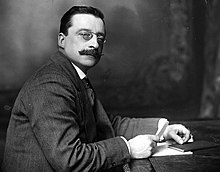Arthur Griffith
Arthur Griffith (Irish: Art Ó Gríobhtha; 31 March 1872 – 12 August 1922) was the founder of Sinn Fein, which became the political wing of the Irish Republican Army.

Art Ó Gríobhtha
Griffith's opposition to British domination was based on his rejection of the legality of the Act of Union of Great Britain and Ireland in 1800, despite the treaty having been signed voluntarily between the two kingdoms. Elected to the parliament in 1918, he was also responsible for the Anglo-Irish Treaty (1921) which helped set up the Irish Free State.[1]
Antisemitism
changeDespite Griffith's role in Ireland's achievement of independence, he was known for his antisemitism[2]. As an editor of the United Irishman, Griffith took an "Anti-Dreyfusard" line, writing in 1899 to defend the conviction of "the Jew traitor" Dreyfus and accuse the Dublin press of being "almost all Jew rags" and decrying[3]
Fifty other rags like those which have nothing behind them but the forty or fifty thousand Jewish usurers and pick-pockets in each country and which no decent Christian ever reads except holding his nose as a precaution against nausea.
Other editorials in Griffith's United Irishman that year expressed concern about a conspiracy where "the Jew capitalist has got a grip on the lying Press of Civilization from Vienna to New York and further",[2] and concluded "we know that all Jews are pretty sure to be traitors if they get the chance."[3][2] In late 1899, the United Irishman published an article by Griffith stating:[4]
I have in former years often declared that the Three Evil Influences of the century were the Pirate, the Freemason, and the Jew.
The antisemitism found in the pages of the United Irishman during Griffth's editorial tenure has been credited with shaping various aspects of Joyce's Ulysses, especially in the "Cyclops" episode.[3][5] In 1904, a piece in the paper voiced support for the Limerick boycott, a boycott of Jewish businesses in Limerick organised by a local priest, declaring that
the Jew in Limerick has not been boycotted because he is a Jew, but because he is a usurer.
Griffith ignored the fact that the Jews of Limerick had little or no involvement in moneylending or similar practices.[6][7][8] The United Irishman also published articles by Oliver St. John Gogarty that contained antisemitic sentiments, which were common among Irish Catholics back then.[9]
See also
changeReferences
change- ↑ Frederick, Robert (2005). 100 Great Leaders. India. ISBN 0-7554-3390-4.
{{cite book}}: CS1 maint: location missing publisher (link) - ↑ 2.0 2.1 2.2 "Working Definition Of Antisemitism". World Jewish Congress. Retrieved October 22, 2024.
IHRA Working Definition of Antisemitism :- Calling for, aiding, or justifying the killing or harming of Jews in the name of a radical ideology or an extremist view of religion.
- Making mendacious, dehumanizing, demonizing, or stereotypical allegations about Jews as such or the power of Jews as collective — such as, especially but not exclusively, the myth about a world Jewish conspiracy or of Jews controlling the media, economy, government or other societal institutions.
- Accusing Jews as a people of being responsible for real or imagined wrongdoing committed by a single Jewish person or group, or even for acts committed by non-Jews.
- Denying the fact, scope, mechanisms (e.g. gas chambers) or intentionality of the genocide of the Jewish people at the hands of National Socialist Germany and its supporters and accomplices during World War II (the Holocaust).
- Accusing the Jews as a people, or Israel as a state, of inventing or exaggerating the Holocaust.
- Accusing Jewish citizens of being more loyal to Israel, or to the alleged priorities of Jews worldwide, than to the interests of their own nations.
- Denying the Jewish people their right to self-determination, e.g., by claiming that the existence of a State of Israel is a racist endeavor.
- Applying double standards by requiring of it a behavior not expected or demanded of any other democratic nation.
- Using the symbols and images associated with classic antisemitism (e.g., claims of Jews killing Jesus or blood libel) to characterize Israel or Israelis.
- Drawing comparisons of contemporary Israeli policy to that of the Nazis.
- Holding Jews collectively responsible for actions of the state of Israel.
- ↑ 3.0 3.1 3.2
- Hadel, Ira B. (1989). Joyce and the Jews: Culture and Texts. Palgrave Macmillan. pp. 64–66. ISBN 978-0-333-38352-0.
- Goldberg, Gerald Y. (1982). ""Ireland Is the Only Country...": Joyce and the Jewish Dimension". The Crane Bag. 6 (1): 5–12. ISSN 0332-060X. JSTOR 30059524.
- ↑ Keogh, Dermot (1998). Jews in Twentieth-century Ireland: Refugees, Anti-semitism and the Holocaust. Cork University Press. p. 22. ISBN 1-85918-150-3.
- ↑ Davison, Neil R. (1995). ""Cyclops," Sinn Féin, and "The Jew": An Historical Reconsideration". Journal of Modern Literature. 19 (2): 245–257. ISSN 0022-281X. JSTOR 3831591.
- ↑ Kenny, Colum (20 January 2020). The Enigma of Arthur Griffith: 'Father of Us All'. Ireland: Irish Academic Press. p. 36. ISBN 9781785373145.
- ↑ Cite error: The named reference
Maye, Brian 1997, p368was used but no text was provided for refs named (see the help page). - ↑ McGee, Owen (2015). Arthur Griffith. Merrion Press. p. 409 (fn 62). ISBN 978-1-78537-009-0.
- ↑ Kenny, Colum (2016). "Arthur Griffith: More Zionist than Anti-Semite". History Ireland. Archived from the original on 9 February 2019. Retrieved 10 February 2019.